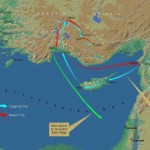New disciples = new disciple makers in Acts 13
In Acts 13, Luke begins by describing how both the Holy Spirit and the church in Antioch sent out Barnabas and Paul. (Acts 13:1-4) The two traveled from Antioch to the port of Salamis, and from there they took a ship to Cyprus.
Once they spent some time in a couple of cities on the island of Cyprus, they boarded another ship and sailed to Perga. (Acts 13:5-12) From there, they traveled to another city called Antioch. This Antioch was in the region of Pisidia. (Acts 13:13-14)
On the first Sabbath that they were in Antioch of Pisidia, Barnabas and Saul proclaimed the good news of Jesus Christ to Jews who were gathered as a synagogue. (Acts 13:15-41) People begged Barnabas and Paul to come back the next Sabbath and teach again concerning the gospel. Some took it a step farther and followed Paul and Barnabas, and, as the text insinuates, begins living in the grace of God. (Acts 13:42-43)
But, then, things get ugly. You see, according to Luke, “the whole city” becomes interested in the message of the gospel and show up at the synagogue meeting the next Sabbath. The Jews get jealous and begin reviling Paul and Barnabas, who then begin to share the gospel directly with the Gentiles. (Acts 13:44-47) The Gentiles (non-Jews) are overjoyed at hearing the message of Jesus Christ and many believed. (Acts 13:48)
This brings me to the point that I want to consider in this post. After Luke says that many Gentiles believed, he makes another interesting statement:
And when the Gentiles heard this, they began rejoicing and glorifying the word of the Lord, and as many as were appointed to eternal life believed. And the word of the Lord was spreading throughout the whole region.
How was it possible for “the word of the Lord” to spread throughout the whole regions (not the city… but the region)? Were Paul and Barnabas responsible for spreading the message of the gospel throughout the region? No, it would be logistically impossible.
Instead, these new believers – these Jews and Gentiles who had only heard the gospel a few days previously – these immature believers who had not had disciples classes or evangelism training or Bible schools or anything like that – these people shared the good news of Jesus Christ to the region around their city and discipled those who believed. And, they did it immediately after they believed.
Oh, how things have changed…
Speaking of complacency… be careful what you pray for
So, last Friday, I published a post called “Complacency infects simple churches as well as institutional churches.” The point of the post was the Christians and churches can become so busy doing other things that they forget the importance of reaching out to those who are not in Christ.
While some may have thought I was ranting against others in the church, I was actually writing from the conviction that God had placed in my own heart. So, that day, I continually prayed that God would break me out of my own complacency and give me opportunities to seek and serve others.
Friday evening, just before sunset, as has been my routine for the last few weeks, I walked around our neighborhood for exercise. Sometimes my wife joins me, but I was alone this time.
Throughout the walk, I continued to pray that God would give me opportunities to reach out to others, and I tried to pay attention to what was going on around me. Toward the end of the walk, when I was pushing myself to complete my 50 minute routine, I saw a neighbor working in his yard. He had recently had some trees cut down, and he was trying to remove some of the stumps… alone… in the heat… dirty.
I did not know this neighbor. I had never met him or his family. I had never been to his house or waved at him as we walked by.
There is a short road that ends in a cul-de-sac beside this neighbor’s house. I turned onto the road and argued with God the entire time I was walking into and out of the cul-de-sac.
Yes, I had just been begging God for opportunities, and now I was explaining to him why I could not take advantage of this one that he was giving me. I didn’t like this opportunity. This is not what I had in mind.
When I returned to the road beside my neighbor’s house, I walked into his yard, introduced myself, and began helping him with his yard work. He told me he was going to work on the stumps again Saturday, so I helped him then also.
But, that’s not the point of this post.
Are we willing to reach out to people on their terms? Are we willing to do whatever, whenever, wherever God gives us opportunities? If not… (and again, I’m talking to myself)… aren’t we still stuck in our complacency?
Complacency infects simple churches as well as institutional churches
Whether you’re more comfortable in a pew listening to a sermon or on a sofa dialoging with others, complacency can infect any group of believers. In fact, we’re often so complacent we change things just so we don’t have to actually change.
We change the teacher or the location or the type of music. We add classes, meetings, media, or meals.
But in the end, very little changes… we remain huddled together, focusing on serving one another, while God is consistently and continually pushing us toward others who are not in Christ.
We meet and meet and meet… and think we’re doing something great. But our meetings (even the best of them) are like practice for a sports team. Nothing actually happens until the team takes the field.
We study the same passages of Scripture again and again and call it discipleship. Meanwhile, who is proclaiming the gospel to those who do not know Jesus. Who is helping the lost, the hungry, the homeless, the prostitute, the addict, the unemployed grow in maturity in Jesus Christ?
Oh, I know, that’s the job of the evangelist, the pastor, the apostle, right? Wrong.
Look around you… look at your life… examine how you spend your time and energy and resources. Do these things show that you are complacent? Are you intentionally investing your life into the lives of those who are not in Christ?
I know that I don’t like what I see in my own life.
Defining what it means to be a missionary
Two bloggers are examining the term “missionary” and trying to put it into its scriptural context. This is difficult to do, since the term is not really a scriptural term. But, their both doing a good job getting people to think about the term “missionary.”
Wes at “a mission-driven life” wrote a post called “Missionary Calling 1.01” which is a follow-up of his previous post “What is God’s calling?”
While Wes’ discussion begins with a consideration of the modern concept of “calling” (which follows from his previous post), he turns to another important topic:
The only thing that I want to add to the whole discussion on missionary calling is that I think we need to move beyond the sole focus on individuals, qua individuals, as the primary agents of mission/s. I believe scripture gives us an ecclesial emphasis in mission. Jesus sends the church. As members of a unified and maturing body, individuals gifted and set apart for service are sent in plural teams, as agents of the church. You see this repeatedly throughout the NT.
Also, Miguel at “Pathways International” wrote a post called “God-Directed Deviations in Missions: Defining Terms Part 2 ‘Missionary’.” As you can probably tell from the title, Miguel’s post is also a follow-up to a previous post.
He writes:
For the most part, I believe that there has been given entirely too much weight to the idea of a missionary being an evangelist. As I said yesterday, there is only one version of bible that even uses the word “missionary” and that version has replaced the word evangelist with missionary on two occasions. Christendom, however has developed an entire doctrine about the word and has attached all sorts of connotations, expectations, and qualifications.
If a “Missionary,” is one sent on a “Mission,” (Our next term in this series), what prohibits the other Ephesians 4 characteristics/giftings from being given equal weight. What of those with the characteristics of an apostle, teacher, pastor, or even prophet.
Do you think it’s important to examine terms like “missionary,” to determine how they’re being used, and to try to put them into a scriptural context?
Second Generation Disciples and the Gentiles in Acts 11
As you probably know (if you’ve read my blog over the last few weeks) our church is studying the Book of Acts together. Last Sunday, we discussed Acts 11, where Peter reports about his encounter with the gentile Cornelius and his family and friends… and the Holy Spirit.
Perhaps the most important verse in that chapter is this one: “When they heard these things they fell silent. And they glorified God, saying, “Then to the Gentiles also God has granted repentance that leads to life.” (Acts 11:18 ESV)
The “they” in that passage refers (at least) to “the circumcision party”, a faction of disciples of Jesus who were upset that Peter had associated with (even ate with) Gentiles. (See Acts 11:2-4.)
The “these things” in that passage is Peter’s report concerning God choosing the Gentiles for salvation and demonstrating that through the work of the Holy Spirit. (See Acts 11:15-17.)
However, there is another very interesting passage immediately following that one. In fact, I almost read over it without noticing it. Here it is:
Now those who were scattered because of the persecution that arose over Stephen traveled as far as Phoenicia and Cyprus and Antioch, speaking the word to no one except Jews. But there were some of them, men of Cyprus and Cyrene, who on coming to Antioch spoke to the Hellenists(1 )also, preaching the Lord Jesus. (Acts 11:19-20 ESV)
“Those who were scattered” seems to point back to disciples of Jesus who had originally been from Jerusalem. For example, Luke had earlier said this about this same group of believers:
And there arose on that day a great persecution against the church in Jerusalem, and they were all scattered throughout the regions of Judea and Samaria, except the apostles. Devout men buried Stephen and made great lamentation over him. But Saul was ravaging the church, and entering house after house, he dragged off men and women and committed them to prison. Now those who were scattered went about preaching the word. (Acts 8:1b-4 ESV)
Now, we don’t know if “those who were scattered” represent first generation disciples (i.e., those who had physically been with Jesus, including the 120 mentioned in Acts 1:15) or if they followed Jesus because of the witness of other disciples (i.e., such as those who were “added” later as reported in Acts 2:41, Acts 2:47, and Acts 5:14).
However, as Luke tells us in Acts 8:1-4 (above), “those who were scattered” (who were not among The Twelve) proclaimed the good news of Jesus Christ with Jews that they met in Judea and Samaria (following Jesus’ prediction/command in Acts 1:8).
Then, at some point, “those who were scattered” continued moving north out of the Judea/Samaria regions. By the time we get to Acts 11:19, “those who were scattered” (from Jerusalem) had reached Phoenicia, Cyprus, and Antioch.
Whether or not “those who were scattered” knew what God had done that day in the house of Cornelius, we are not told explicitly. But, we are told that while “those who were scattered” were traveling farther from Jerusalem and into more Gentile territory, they continued to proclaim the gospel to Jews only.
Then, another generation of disciples came on the scene. These are disciples who heard the message of the gospel proclaimed by “those who were scattered.” They are described as people from Cyprus and Cyrene. When they came to Antioch, they did something still considered outrageous by “those who were scattered” (at least, they would have considered it outrageous if we consider their action).
These second generation (at least) disciples began proclaiming the good news of Jesus Christ to Gentiles – that is, to people from nations other than Israel… to people who were not ethnic Jews.
Once again, we see God using The Twelve to introduce a work (i.e., salvation offered to the Gentiles), but using others (who were not numbered among The Twelve) to expand it.
Looking back at Acts 1:8 (“But you will receive power when the Holy Spirit has come upon you, and you will be my witnesses in Jerusalem and in all Judea and Samaria, and to the end of the earth.”), I think it’s safe to say that Luke did not consider Jesus’ words to apply only to The Twelve, or only to those who heard the words. Instead, Luke paints the picture of a church in which every believer understood himself or herself to be a witness of Jesus Christ.
A different kind of soup kitchen and a different way of going
Chris at “The Amplified Life” has written another great missional (true) story in his post “Soup for the Soul: A Positive Example of a Local Church ‘Going’.”
In the post, Chris tells the story of a group of Christians who decide to start a soup kitchen to feed people from the neighborhood who are hungry and needy. It doesn’t go so well. Very few people come to the soup kitchen.
So, do these brothers and sisters give up? Nope. They decide to go to the people who are hungry and needy.
Here’s part of the story:
A little while ago a layperson from the church approached Ken and asked if they could start a weekly soup kitchen from The Hub. Ken’s response was great. He basically said, “Build a team and go for it, but you lead it.” They called the ministry Soup for the Soul. For the first few weeks they either had no one show up or only about 1 or 2 people show up to receive a meal. Then the leadership of this ministry realized something. No one is coming but there is a low income apartment complex two blocks away. What if we take the food to them?
This began a great change. For weeks now Soup for the Soul, which is completely lead by laity, went from serving 0-2 people each Wednesday evening to serving 30-40 people each Wednesday evening! They spend time with the residents. They pray with the residents. They have distributed about 10 Bibles. The residents of this apartment complex look forward to this church arriving every Wednesday. This church is loving on the people of this apartment complex.
What a great story! And, notice, this is a traditional church. It is not an organic/simple church. That makes it even better!
I love to see people moving beyond what is expected and going out to the people who need to the love of Christ!
Read the rest of Chris’ short article and notice the two positive examples he takes from this true story.
The missionary nature of the early church
In today’s church, it is typical to think only of certain specially called, specially trained, and specially ordained people as “missionaries.” The early church had a very different idea of their mission to proclaim the good news of Jesus Christ to the people, villages, cities, and regions around them.
When we think of “missions” in the early church, we tend to start with Saul/Paul. His dramatic conversion from a persecutor of the church to an “instrument” of God is recorded by Luke in Acts 9. Similarly, Luke records how the Holy Spirit and the church in Antioch set apart and sent Paul and Barnabas as itinerant servants of Jesus Christ in Acts 13.
The conversion and sending of Paul tends to fall into the pattern that has been practiced by the modern church. However, focusing on Paul’s story fails to take into account the broader account that we find in Acts.
For example, in Acts 8, we see that the church is scattered as result of persecution following the stoning of Stephen:
And there arose on that day a great persecution against the church in Jerusalem, and they were all scattered throughout the regions of Judea and Samaria, except the apostles. (Acts 8:1 ESV)
While the term “all” is probably hyperbolic, it seems that a great number of Christians left Jerusalem and were scattered “throughout the regions of Judea and Samaria.” This parallels Jesus’ command in Acts 1:8, “You will be my witnesses in Jerusalem, in Judea, in Samaria, and to the ends of the earth.” (It is interesting that the apostles (the Twelve) remained in Jerusalem.)
But, what did this early Christians do while they were being scattered throughout Judea and Samaria? Luke tells us just a few sentences later:
Therefore, those who had been scattered went from place to place proclaiming [the good news of] the message. (Acts 8:4, author’s translation)
While it took persecution to force those early Christians (except the apostles?) away from the comfort zone of Jerusalem, once they were forced away from their homes they remembered their common call to proclaim the good news of Jesus Christ wherever they went.
The verb that I translated “went from place to place” indicates that many of them (at least) did not settle in one place, but continued moving around in order to proclaim the good news. (For other related usages of this same verb, see Acts 8:40 and Acts 9:32.)
Of course, in the remainder of Acts 8, we see Philip as an example of a believer who was traveling from place to place and proclaiming the good news. At one point, he’s telling entire villages about Jesus Christ, and at another point he’s telling a single person about gospel. Either way – wherever he is and whoever he’s around – he’s proclaiming the gospel.
What was the result of the service of these early Christians? By the time we get to Acts 9:1, we see Saul (Paul) traveling as far away as Damascus in order to continue persecuting the church. Later, at the end of chapter 9, Peter is traveling through Lydda and Joppa and finding established believers there as well.
(As an aside, it is interesting that the end of Acts 9 finds Peter traveling. Before, if you remember, the apostles were all staying put in Jerusalem. Perhaps God used Saul/Paul as an example to push the apostles into the role that God had called them to: itinerant servants of Jesus Christ.)
This is the context where we find Saul/Paul’s conversion and sending to the Gentiles. While Paul’s story is dramatic, he is not alone in being sent to proclaim the good news of Jesus Christ and to encourage Christians that he finds. In fact, while Paul and Barnabas is sent far away from their homes, they are not the first nor the last early Christians that God sent on his mission.
The first chapters of the Book of Acts – and Acts 8-9 in particular – shows that the early church saw missions (proclaiming the good news of Jesus Christ as well as strengthening the church wherever they went) as their common calling. While there were some who were specially called or gifted to travel from place to place or even to go to a specific place, this special calling or gifting was not necessary for them to take their part in God’s mission.
Each Christian recognized that when God called them to himself, he was also sending them out into the world. (Of course, even then God had to push some out of their comfort zone – even through persecution – before they took their part in God’s mission.)
Lessons learned (?) from a short term mission trip
Our family and three of my daughter’s friends spent last weekend with family near Knoxville, TN. The trip was an early birthday present for my daughter, Miranda. The girls all went to a concert, and we also spent time in Gatlinburg, TN and at Dollywood.
On Sunday morning, we met with our hosts’ church. We didn’t have much time, so we did not get to meet anyone who is part of the church – except for our family, of course.
But, we were excited to see that a group was presenting a short term mission trip report while we were there. (Thus, we missed – in a good way – most of the “patriotic” stuff that happened when many churches met last Sunday.)
Several people (maybe 20?) from this church – mostly teenagers – spent some time in an orphanage in Central America. They took turns telling about their experiences. I enjoyed hearing from the different people – not what normally happens in most churches.
They talked about the orphans, and a school, and some construction… etc. One young man (maybe 16?) shared about his experience sharing the gospel on the streets of the city. In fact, he told us that it was the first time he had ever shared the gospel with anyone. He was able to talk with at least two young men on the streets of (verbally) received the good news as he shared it with them.
This young man pointed out that he shared the gospel with people while on this short term mission trip because it was expected of him. In fact, he expected to share the gospel with others when he agreed to travel to this Central America country with his friends.
He also said something very important (and someone else repeated it later): While he expected to share the gospel while on the mission trip, he did NOT expect to share the gospel with anyone while at home.
This is a lesson that this young man learned on the trip – and it’s the lesson that I carried away from meeting with this church as well. What do we expect of ourselves while interacting with others? Do we expect to share the gospel? Do we expect to build up brothers and sisters in Christ that we meet? Do we expect to find people who need to be served? Do we expect to give money, resources, and time to people in need?
And, when do we expect these things? Do we only expect them in certain circumstances (i.e. “in church”) or are we expecting God to provide opportunities anytime and anywhere with anyone?
I’m glad this young man learned this lesson on the mission trip. I’m praying that he continues to learn the lesson, and that God gives him opportunities at home. (I know that God will do this… so I’m also praying that the young man will respond appropriately.)
I’m also glad this young man had an opportunity to share this “lesson learned” with us. I’m praying that all who heard will take this lesson to heart.
Of course, I heard also… which means I’m praying for myself as well.
Which is important for the church: edification or mission?
There is a bit of a feud (and that is a huge overstatement) going on between two of my friends – real friends – on their blogs.
It started when Eric at “A Pilgrim’s Progress” wrote the post “No Guarantee.” In the post, Eric exhorts the church to seek to edify one another. He concludes, “I simply want to encourage us all to be intentional in our efforts at mutual edification as the body gathers. Otherwise we miss the point of the meeting altogether.”
In response Dave Black (Wednesday, June 29, 2011 at 9:32 a.m.) says, without disagreeing with Eric, that the church’s purpose is mission. He writes, “As I understand Scripture, the church is to carry out the Missio Dei of the Triune God at both the micro (individual salvation) and macro (societal) levels, with a view to redemption, reconciliation, and social transformation.”
So, is edification important for the church or is mission important for the church? The answer is, obviously, YES! Both edification and mission are important – and vital and necessary – for the church.
As Eric pointed out, when the church gathers together – that is, whenever we are together with other brothers or sisters in Christ – our goal should be to build up one another – to help one another grow in maturity in Jesus Christ.
Edification is the responsibility of every believer – yes, every believer, not just leaders – whenever the church gather together. And, edification includes anything that allows us to help one another walk in the Spirit (put on Christ, mature in Christ, honor God – however you want to say it). We are all ministers (servants) given to the church by God to help the church grow in his grace.
For further explanation, see my recent post “Whenever you come together.”
But, as Dave pointed out, we are also to carry out the mission of God. This mission takes on both an individual aspect and a societal aspect. While proclaiming the good news of Jesus Christ to people we meet (with both our words AND our actions), we are also to be serving those around us (our neighbors, our co-workers, other students, others in our communities) in order to demonstrate the kingdom of God to the world.
Again, this is the responsibility of ALL believers – not just leaders or those who are “specially called.” We are God’s witnesses testifying of the good work that God is doing in our lives. We are all missionaries sent into the world by God to carry out his mission.
In fact, we may choose carry out this mission together – with other believers. In that case, our missional lives become a further opportunity to edify the church, thus carrying out both aspects of church life listed above: edification and mission.
(For further explanation, see my recent post “Our shared mission.”)
So, yes, when the church comes together, we are to build up one another in maturity in Jesus Christ. And, we are to carry out God’s mission as those sent into the world by God.
Both are important for the church.
A people who live in fellowship with God
Occasionally, I come across a post or paragraph that really makes me stop and think… ok, so that happens often. And, I’m glad that it happens often.
But, when I read “God’s eternal purpose is found in the church life” by Josh (at “Called to Rebuild“), I really resonated with what he said.
Now, when some read the term “church life” they think about attending events and participating in programs at a certain building, but I’m pretty sure that’s not what Josh is talking about. In fact, this paragraph pretty much guarantees it:
For the past three years I have had the privilege of living and gathering with a small company of believers for whom life in Christ is more than a private, individual affair. We have gone through many seasons, had our fair share of highs and lows, and learned that Christ is found in the mundane aspects of life as well as the spectacular. Being built together in this way is worth its weight in gold, if you ask me. I so appreciate the church life, and I’ve come to see that this is the very heartbeat of God. The church life is the very center of His purpose and the end of all His activities. What God is ultimately seeking to obtain is a people who live in fellowship together with Himself.
Here’s the thing, as John told us, when we share life (fellowship) with one another, then we also share life (fellowship) with God. (1 John 1:3) If we are sharing in God’s life, then he is not only leading us to other believers, but he is also leading us out into the world.
When we share life with God, we are both gathered and sent. And, as Josh pointed out, this (gathering and sending) often happens when we fellowship with God in “the mundane aspects of life”










